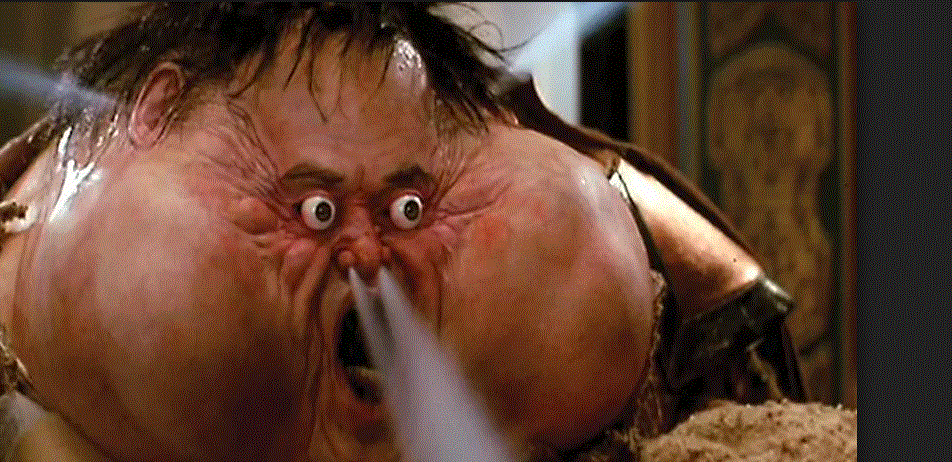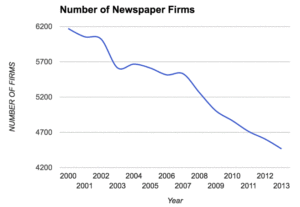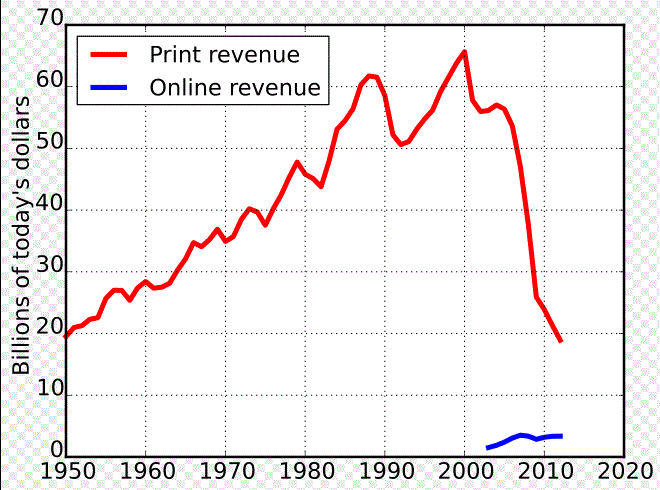
The hate is on for Councilor David Madore, and the torches are being lit from the bonfire hosted by the local press, which has gone far beyond their nominal role as reporters of the news to makers of the news.
The Devolution of the Old Media
Before talking about the status of the local old media (the Columbian), it’s important to present a thumbnail history of the decline of the American press.
The Fourth Estate – the press – was considered by many founding fathers as essential to a functioning democracy, despite a sometimes adversarial relationship between government and editors. The autonomy of the press is the first protection in the Bill of Rights, guaranteeing that the government could never restrict what the press could and couldn’t say. However, as any Jesuit ethics instructor will point out, whenever you hear about rights, you immediately need to consider the responsibilities that go with those rights.
The autonomy of the press is essential, in the hope it will provide accurate information on matters of substance, whether reporting progress or sniffing out and exposing corruption at the highest levels of government. The press should be a key watchdog of government, expected to report facts to the citizens and provide them with information needed with which to make informed decisions—especially at the ballot box.
Notwithstanding the founder’s vision for the press in a free society, they knew the typical quest for power and profit would be a corrupting factor. Early journalism was often absurdly biased in its reporting, to the point where few could even take it seriously. The market tended to weed these out over time, the result of a competitive race for greater circulation among competing papers. Idealistic journalistic standards began to be taught in colleges around the beginning of the twentieth century, and papers found that a prime competitive edge lay in trustworthiness. The potential for legal action against scurrilous reporting made editors risk-averse and encouraged them to adhere to a standard of accuracy. If a printed story contained errors, a paper’s competitors would often capitalize on it to discredit the paper. In the highly competitive world of news reporting, the successful publications eventually absorbed their less prosperous competition, effectively developing local monopolies on the information available to the public.

The 1960’s saw the integrity and ideology of the press begin to shift. A professional student class developed to avoid compulsory military service, and journalism was a favorite of the anti-war students who didn’t want to go to Vietnam, and who wanted to make a difference in the world. These were also the early days of overt liberalism infesting Universities at all levels. This resulted in the political inclination of the press tilting sharply to the left.
Constrained by a minimum facade of ethics, the threat of legal action and competition, the press found more subtle ways to influence public opinion and further their agenda. They could maintain conditional accuracy in what they reported, but still sway the public by what they reported and did not report. If it wasn’t reported, it wasn’t important. Editors found they could define the public discussion by how they placed the importance of what they wrote. Page one, above the fold, was very important, no matter how trivial it was in reality, the press could lend it an air of gravitas by just telling the public it was important. Editors could also flirt with accuracy without crossing the line, by simply using editorial labels. A perfectly reasonable stance by a politician could be derailed if the papers labeled it “controversial.”
The press flexed its muscles in the Vietnam war, by printing articles that reflected badly on the conduct of the war, refusing to print objective reports on successes of the war, highlighting anti-war protests and developing a narrative that the country was up in arms about the war, which was only true among small parts of the population.
In 1972, a petty burglary of the Democratic National Convention Headquarters was seized upon and blown way out of proportion into a major scandal by two junior investigative reporters, Bob Woodward and Carl Bernstein, who had an ideological axe to grind. President Nixon first learned about it on the beach where he was vacationing, and his first response was, “Well, that was a stupid thing to do.” Bugging one’s political opponents was nothing new, the Kennedys had used bugs extensively in their political campaigns against Republicans, which didn’t raise the ire of the public, because it wasn’t done under the color of apparent legal authority, so lacked an essential component of a scandal. Both the Kennedy and Johnson administrations had a more problematic history using warrantless wiretaps on political opponents, suspected communists and civil rights activists.

Woodward and Bernstein blew open the story, and insinuated that more was coming. They posed leading questions in their articles, unfounded suspicions, and then capitalized on the administration’s attempts at damage control. The administration was investigating the source of a leak of highly classified military plans in Vietnam that had been published in the New York Times, attempting to get evidence to indict Dr. Daniel Ellsberg on a variety of charges. Woodward and Bernstein’s investigation uncovered irregularities in the conduct of that investigation. They learned that the White House had an automatic recording system installed from the Johnson administration that Nixon used, and demanded the tapes be turned over. Following the Pentagon Papers leak, the White House had no intention of opening the contents of those tapes in the midst of the Vietnam war and sensitive trade negotiations with China that could be damaged if the hostile press selectively released excerpts of the tapes. Nixon’s resistance was greeted with accusations that he must be guilty if he wasn’t forthcoming, that he had to be hiding something. The public narrative was molded by Woodward and Bernstein. Objective analysis of why the White House reasonably refused to publish the contents of the tapes never made it to press. Accusations of perfidy were page one on a daily basis and the lead story on the nightly news. When Nixon’s secretary, operating the recording machine while making transcripts, accidentally erased a few minutes of tape, the press charged the White House with obstruction of justice and deliberately destroying evidence, and scoffed at the reason for the erasure.
The president was in the position of constantly having to respond to the sort of “Have you stopped beating your wife yet” questions and was never able to seize the initiative from the press. There was no new independent media, no effective conservative voice to offer a balanced view of the affair and call the press out for the witch hunt they were on. The Administration made mistakes and did some questionable things to try to put the issue to bed, which were discovered and seized upon as further evidence of cover-ups and scandal. “What did the president know and when did he know it?” became the mantra. Inevitably, Nixon was driven from office, facing a hostile congress, many of whom had been elected on liberal, anti-war platforms. The press had done it. They had manufactured a narrative out of nearly nothing and influenced public opinion to take down the biggest target in politics.
The Failure of the Press in Clark County
 The Columbian has followed the same path as described above for the general old media. For decades the Columbian has been a left-leaning publication with an increasingly tarnished reputation concerning journalistic excellence. David Madore was elected in 2012 on a platform of enabling the free market, reducing government waste, cutting back low-value programs and government transparency, and the leftist editor and writers of the Columbian lost their minds. Madore had a rough start in public office, as he led the effort to change the culture of the county government as one would expect a businessman to do, without communicating his vision to the bureaucrats expected to implement it, or explaining the process adequately to the public and seeking the support of the media. Many of his solutions seemed counter-intuitive to liberals, who can never seem to understand that there are other ways to increase government revenue besides raising taxes. Most of Madore’s more innovative programs, such as eliminating public park fees and streamlining the permit process, were met with skepticism by the Columbian and denounced as “risky” and “controversial.”
The Columbian has followed the same path as described above for the general old media. For decades the Columbian has been a left-leaning publication with an increasingly tarnished reputation concerning journalistic excellence. David Madore was elected in 2012 on a platform of enabling the free market, reducing government waste, cutting back low-value programs and government transparency, and the leftist editor and writers of the Columbian lost their minds. Madore had a rough start in public office, as he led the effort to change the culture of the county government as one would expect a businessman to do, without communicating his vision to the bureaucrats expected to implement it, or explaining the process adequately to the public and seeking the support of the media. Many of his solutions seemed counter-intuitive to liberals, who can never seem to understand that there are other ways to increase government revenue besides raising taxes. Most of Madore’s more innovative programs, such as eliminating public park fees and streamlining the permit process, were met with skepticism by the Columbian and denounced as “risky” and “controversial.”
Madore was instrumental in helping shut down the Columbia River Crossing (CRC) boondoggle, a never-ending money pit locked in an endless cycle of spending to try to reconcile mutually exclusive design requirements for a bridge to replace the I-5 Interstate bridge. The Columbian was a vocal advocate for the CRC and light rail, as it is for any program with a high potential for graft and corruption. Madore’s opposition earned him the eternal enmity of the Columbian and local establishment group thinkers.
The Columbian’s hateful propaganda about Madore is amplified by the vocal liberal minority in the county. Self-described conservative Democrat Chuck Green, a project manager at C-TRAN and one-time candidate for the County Council District 2, riffs incessantly on the anti-Madore theme in his social media group Clark County Citizens for Good Governance (C3G2). The sycophantic liberals that populate this group have a grand time chanting anti-Madore propaganda, reinforcing their preconceived notions in an echo chamber of incoherent hate. Any voice of reason who introduces a balanced viewpoint about the many successes that Madore’s policies have had is quickly shouted down despite Chuck Greene’s remarkably evenhanded approach to discourse in the group. Facts aren’t relevant, the narrative is formed by the press and promoted by those whose worldview it fits.
Since the reset of the local Republican Party in 2012, Madore has found himself ideologically aligned with the conservative grassroots group that took control of the party. Old-guard establishment Republicans, cheesed about their power and prestige being greatly reduced, have aligned themselves with liberals in their animosity toward Madore, identifying him as the poster child for the conservative movement that crashed their country club and took over. The lack of objectivity and factual analysis associated with the these people’s hatred of all things David Madore has led to the condition being referred to as “Madore Derangement Syndrome.” The fear mongering and hatred displayed by victims of this affliction is an attempt to whip up public hysteria against David Madore. This has manifested itself with things like past Republican Party chairman and consummate moderate Brent Boger’s recent analysis of this year’s local political candidates in terms of “Madore” candidates and “Non-Madore” candidates.
The centerpiece of this false narrative is identifying Madore as “divisive” and “controversial.” This sociopathic accusation is promoted by intransigent establishment politicians and groupies who will accept nothing less than Madore’s political defeat to end the “divisiveness.” Their inability to cooperate, to seek common objectives and disagree respectfully on the basis of logic and facts is the source of the divisiveness of which they accuse Madore. The only way a politician like Madore can avoid being divisive with these uncompromising, hysterical people is to acquiesce to their agenda in every way. It’s not that Madore is divisive, but that he has a different agenda, a different set of core values, and a different approach than do the big-government Clark County establishment — a local establishment composed of activist liberals, nearly all senior bureaucrats, and many moderate Republicans. They simply cannot tolerate it. Their arguments are fundamentally bankrupt, because of the success that Madore’s policies have been met with, so they are reduced to ad hominem attacks, generalizations, outright lies, and a false narrative to remove his disruptive influence in their power games. But it’s their culture, and but for a few of them, they believe their fiction and can be clinically diagnosed with Madore Derangement Syndrome.
The Columbian’s inability to be an objective watchdog of local government has not gone unnoticed. Declining readership and advertisers have forced cutbacks at the paper, due in part to the erosion of the public’s confidence in the paper to deliver accurate political analysis. The only people who pay attention to the Columbian’s political nonsense are those for whom the narrative fits their big-government worldview (those who suffer from MDS). Staff cutbacks are something a business does when times are slow while waiting for the next economic or industry upturn. This doesn’t seem the case with the Columbian as its decline is largely self-inflicted and management is apparently unaware or unwilling to acknowledge that a radical shift in its approach to the news is the only thing that can save it. Madore Derangement Syndrome apparently gives those afflicted a high—and with the owners and editors of the Columbian, this is more important than truth or the long-term viability of their business.
Reality
For those who would like to learn more about the real David Madore follow this link to see a series of three videos produced in the last year.
Videos by independent producer Dick Sohn with various people who have significantly interacted with David Madore:
- Bill Gibbons – Superintendent of Cornerstone Christian Academy Supports David Madore for County Council
- Rey Reynolds for David Madore
- Dell Harris a US Digital employee shares his unwavering support for his boss and friend David Madore
- Dr. Don McIsaac endorses David Madore for Clark County Council Chairman
- Marvin Spires for David Madore
- Tracy Stevens for David Madore
- George Golden for David Madore
